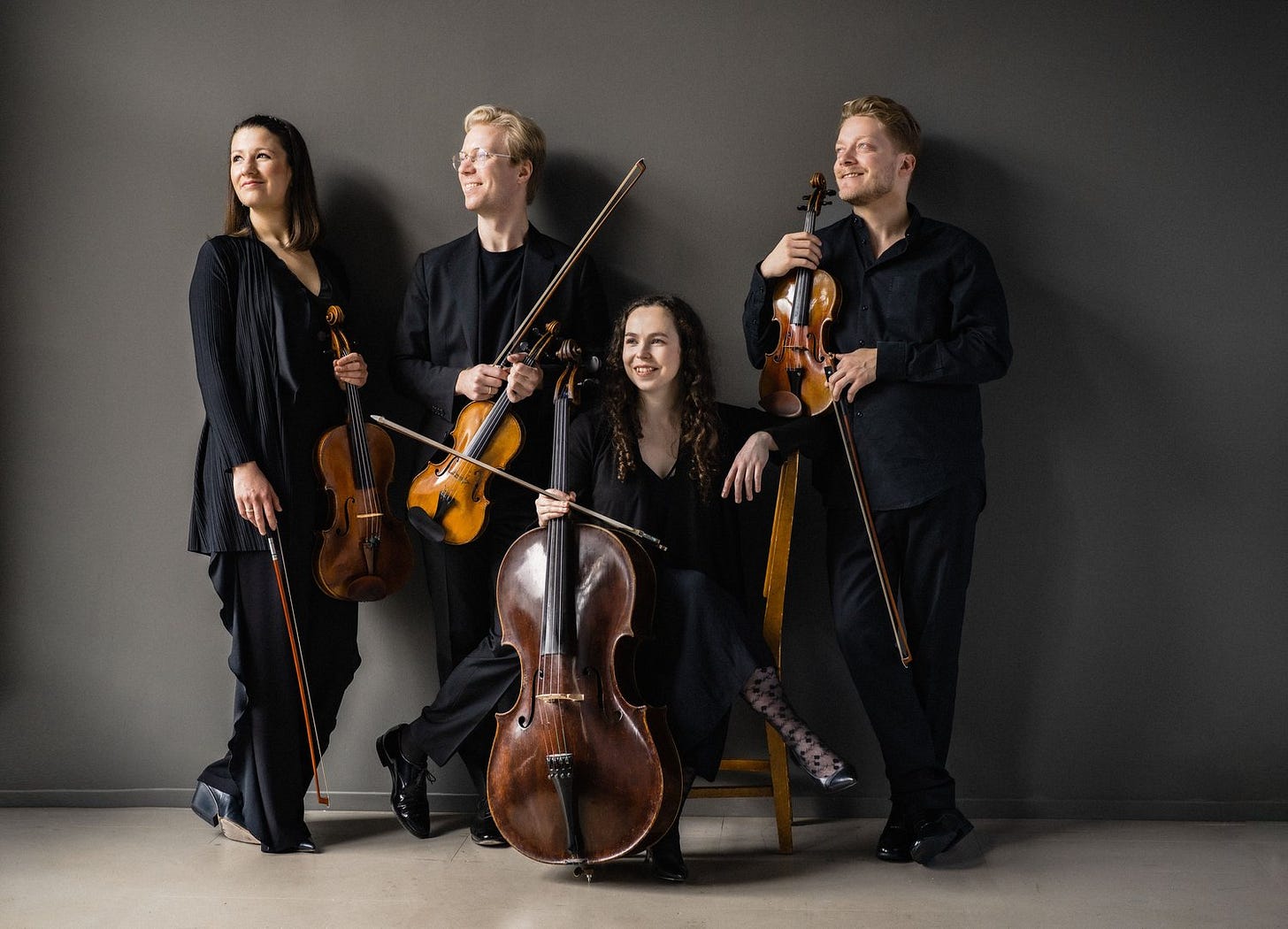Leoš Janáček, String Quartet No. 2, 'Intimate Letters'
Performed by the Marmen Quartet at the Wigmore Hall, 26 March 2023
by Iliana Gutch Marinov
Today The Modena Review hosts its first ever guest writer, my learned friend Iliana Marinov, who offers this meditation on a performance of a Janáček string quartet. Enjoy!
If the Classical quartet is indeed what Goethe described as ‘four rational people conversing with one another’, the conversation of Janáček’s String Quartet No. 2 is a rich one, discoursing passion, introspection, love for one’s nation, and for another. Entitled ‘Intimate Letters’, this epistolary composition is named after and inspired by the 700 or so letters Janáček wrote to Kamila Stösslová, a married woman whose love he longed for.
It does not seem that Stösslová returned his affections, and so the quartet is often regarded as an expression of unrequited love. The viola part, which Janáček originally wrote for the viola d’amore, is considered to be the musical representation of Stösslová. This 7-stringed Baroque instrument, which possesses a distinctively silvery, muted sound, is mentioned in a letter to Stösslová. Janáček writes that his use of this ‘special instrument’ would mean that ‘in this work I will be alone with you’. Milan Škampa, violist of the Smetana Quartet, even interprets the third ‘letter’, or movement, as a lullaby for her and Janáček’s unborn child.
But can this quartet simply be described as a musical manifestation of Janáček’s romantic fantasy? After hearing this piece being performed by the Marmen Quartet at the Wigmore Hall, it became apparent to me that it could not. As the second of the ‘Bohemian Quartets’, ‘Intimate Letters’ is not only a love letter to Stösslová, but to Janáček’s homeland of Czechoslovakia. The prevalence of Bohemian and Moravian folkloric motifs, offset against lyrical melodies, is unmissable.
The second movement opens with an Adagio section. Here, the viola is first to introduce a melody that becomes increasingly fragmented as it is passed between the instruments. Janáček’s experimentation with modes at the beginning of this movement creates an ethereal sound. The melody then transforms as the players enter the Vivace section, as it is superimposed over a jaunty polka-esque rhythm. The frequent changes in tempi, experimental use of modes and harmony, and driving dance rhythms give the movement its distinctive folkloric quality, and render the second movement a tempestuous and expressive one.
Incidentally, Janáček’s references to folk music played a key role in his rising prominence. After his rise to fame in Prague following the success of his opera Jenůfa in 1904, Janáček was influential in creating a distinctive Bohemian or Moravian voice in modern music. He studied Moravian and Slovakian folk music extensively, and, when writing ‘Intimate Letters’ a decade after Czech independence had been achieved, had not relinquished this voice.
The opening of the quartet’s final movement sounds like pure folk. This continues until the middle section, in which a restrained melody emerges from the viola. This momentary serenity is soon over, and the piece ends with tutti playing furious tremolos, followed by a climactic frenzy of frantic trills and arpeggi in the first violin part, with the other instruments repetitively resounding the discordant final harmony. At the movement’s coda, the conjoining of elegant melodies with the Bohemian and Moravian motifs all culminate to create Janáček’s expression of love – and the unique emergent voice of Czech independence. As Janáček himself said, ‘a pure musical note means nothing unless it is pinned down in life, blood, and locale; otherwise, it is a worthless toy’.
The performers, the Marmen Quartet told Janáček’s story of love and yearning with great poise. As an ensemble they were seamless, emerging in the unison sections as one voice. With moments of brilliance throughout the performance, this relatively young quartet has developed an exciting sound. The violist in particular showed moments of virtuosic playing, in a piece with considerable demand on the instrument. Overall, the Marmen Quartet have worked to create a modern take on a classic visionary’s composition.
Iliana Gutch Marinov
Iliana is a violin and piano teacher based in Cambridge. She holds degrees in literature from the universities of Leeds and York and is now training in the Suzuki violin method. She works part-time for a charity that provides education for teenagers and young people not in mainstream schooling, where she takes lessons in English and keyboard. Iliana is half Bulgarian, and enjoys spending her summers holidaying by the Black Sea.
(Ed.) Those interested in Janáček’s colourful love life may enjoy the book named after the quartet, Intimate Letters: Leos Janáček to Kamila Stösslová, translated and edited by John Tyrrell. There is also, for insatiable readers, Tyrell’s gigantic two-volume biography of the composer, which comes to two or three thousand pages.





I'll leave you to do that!
I really enjoyed reading this review! Well done, Iliana!